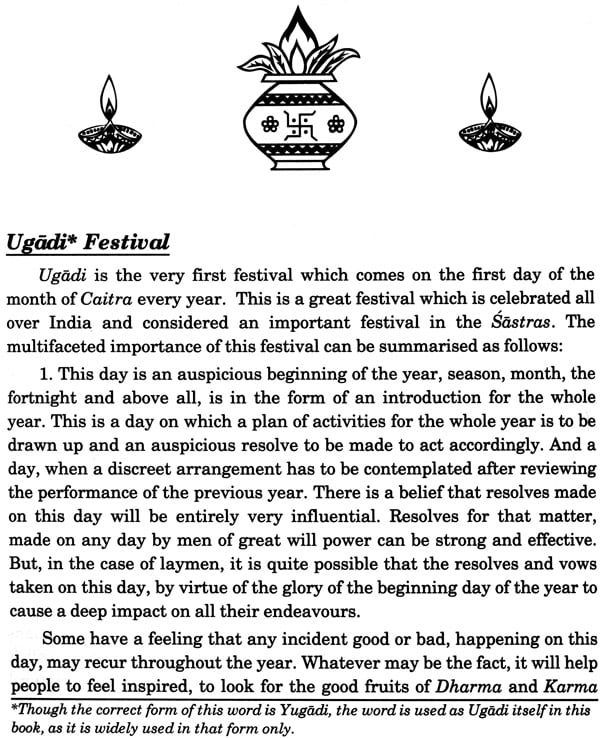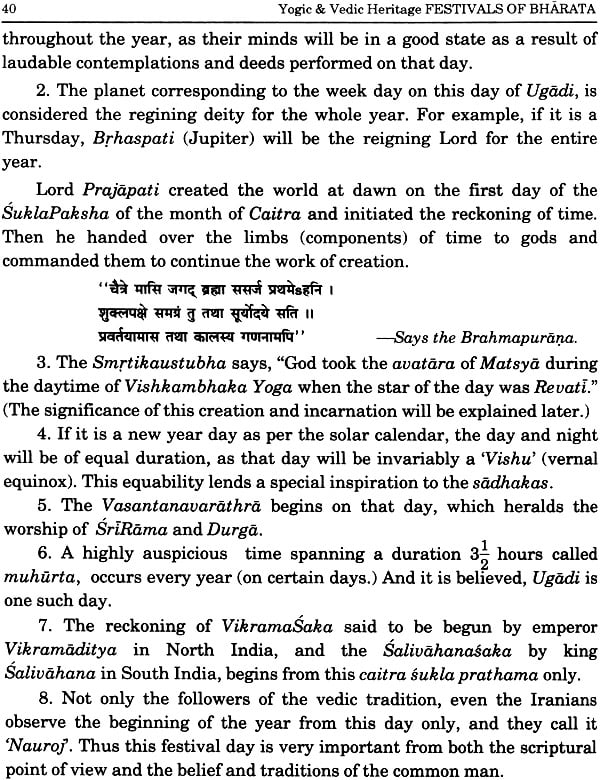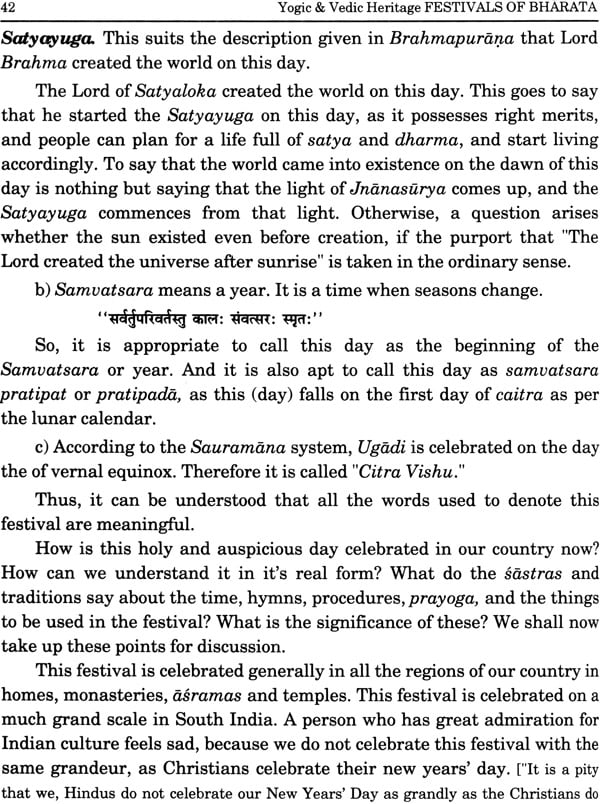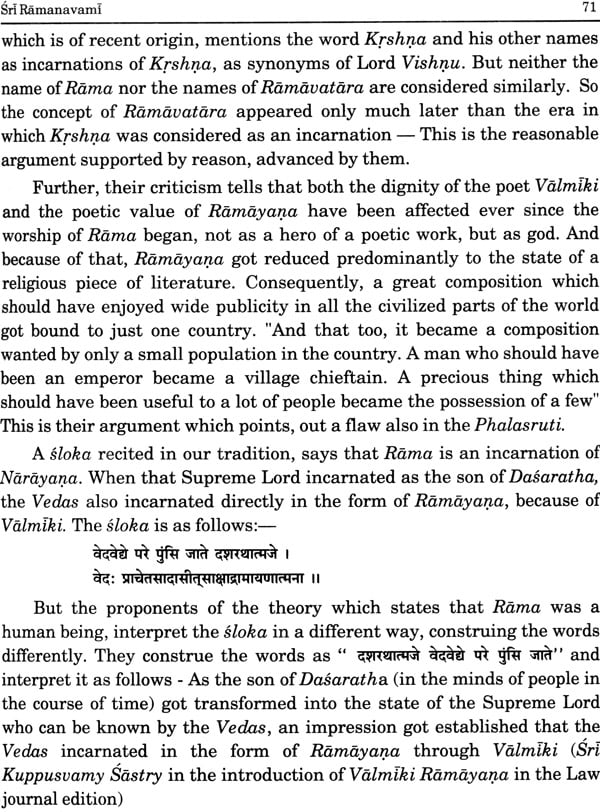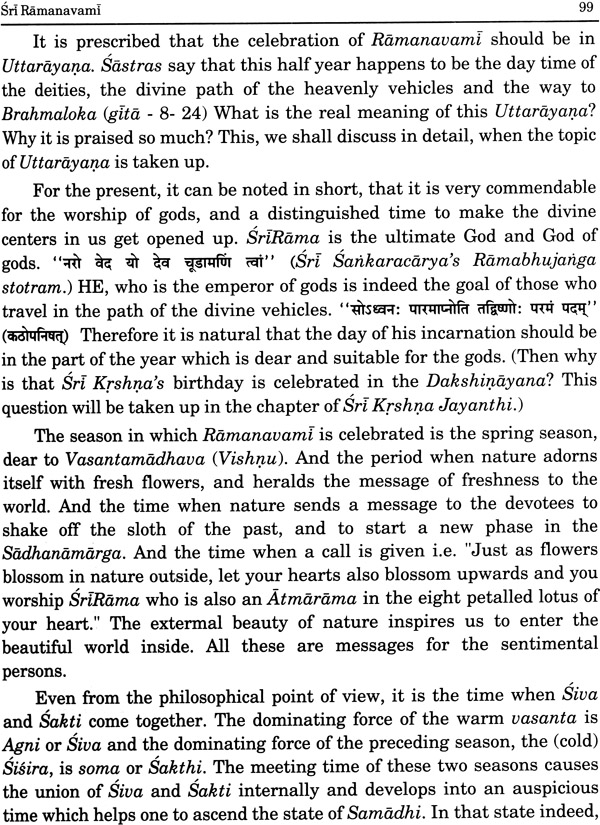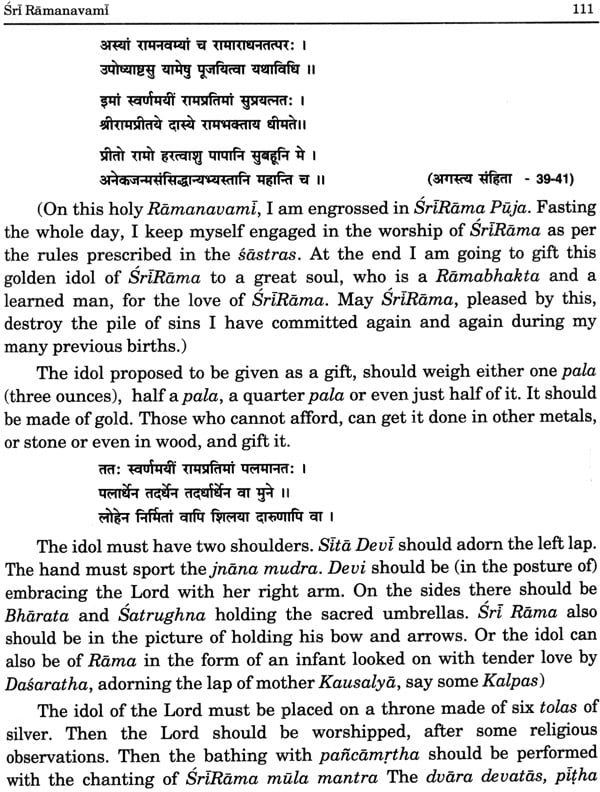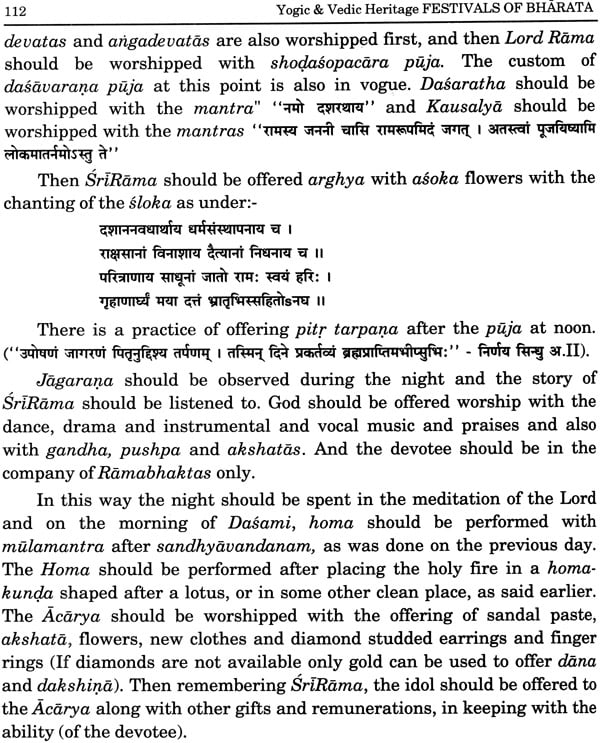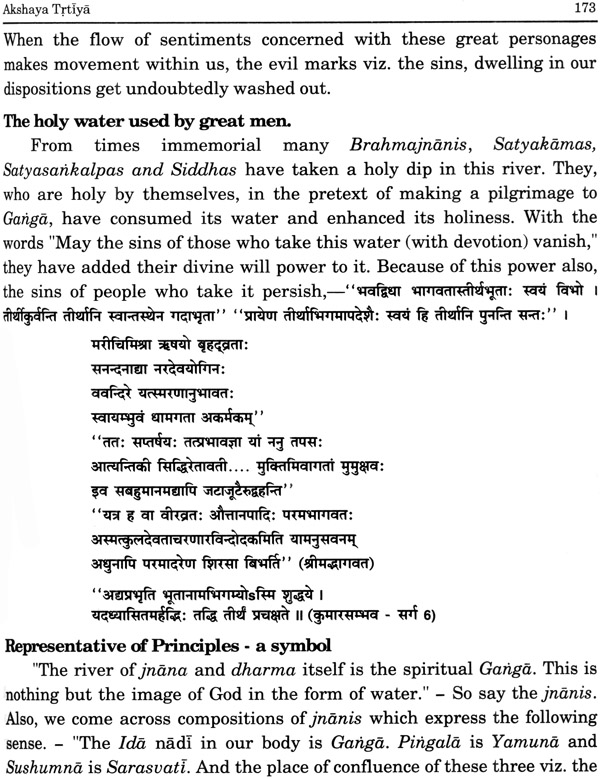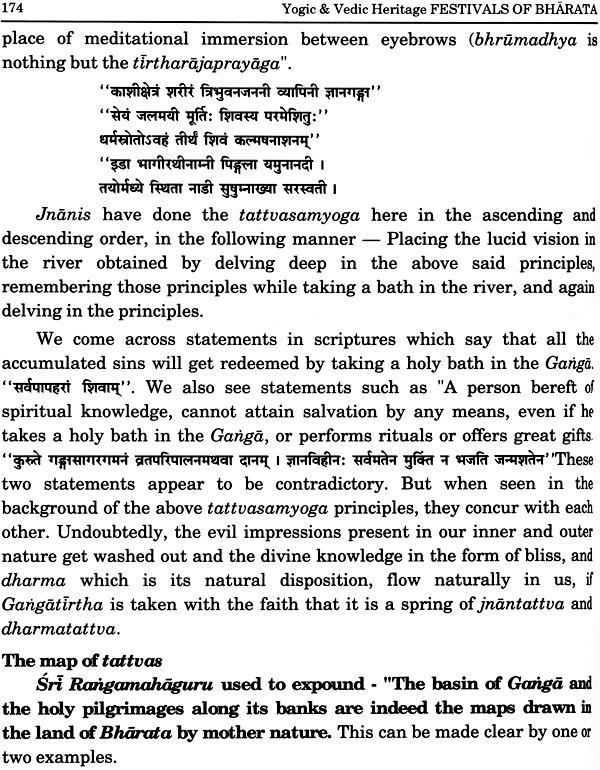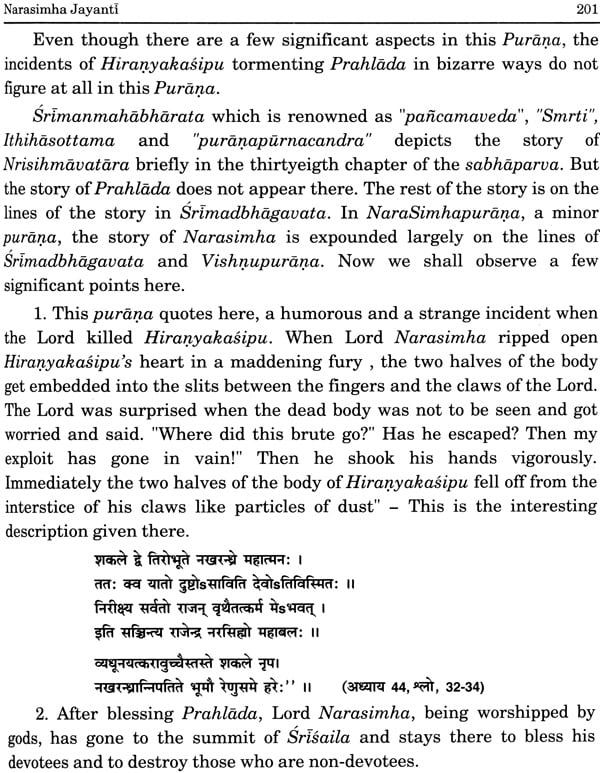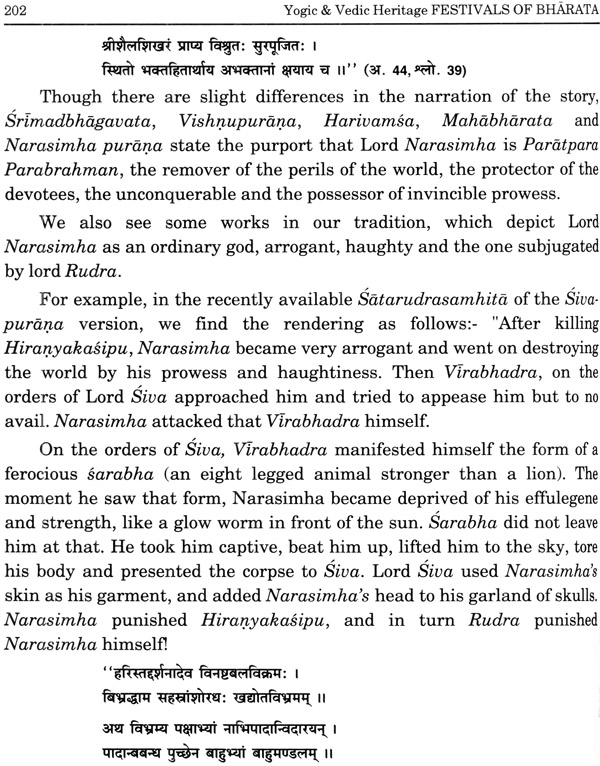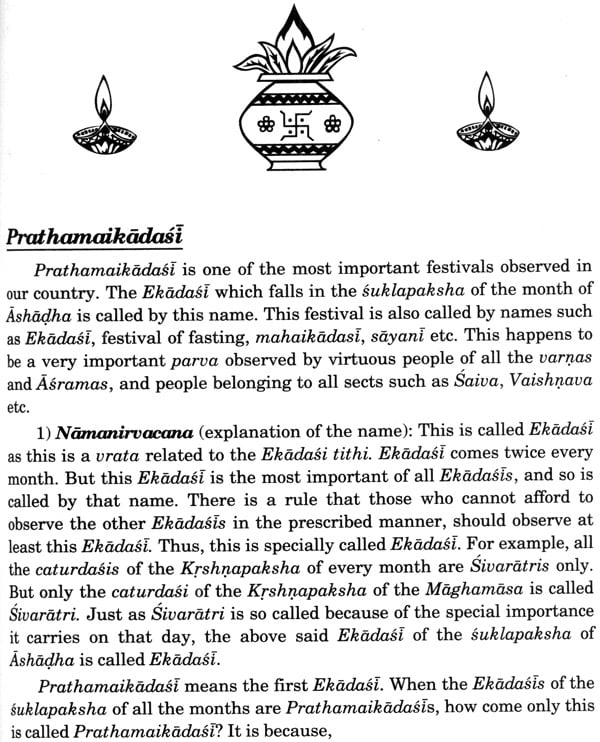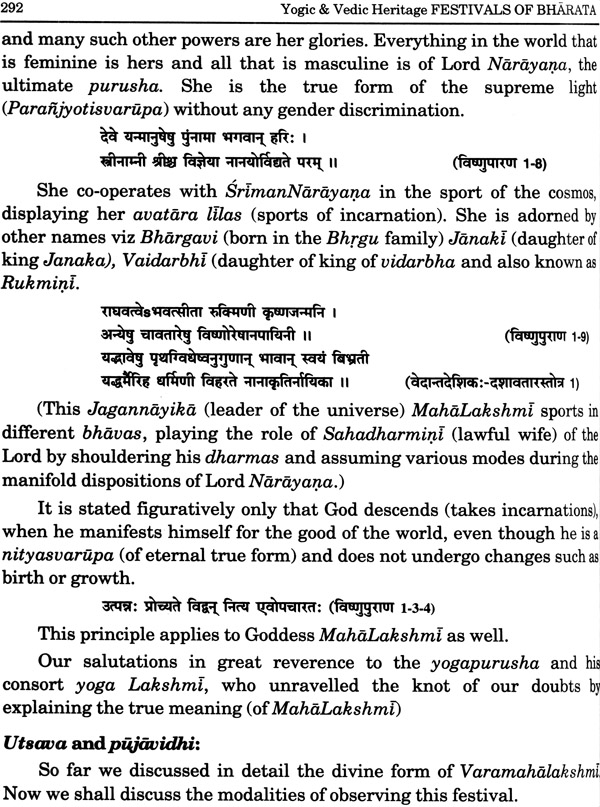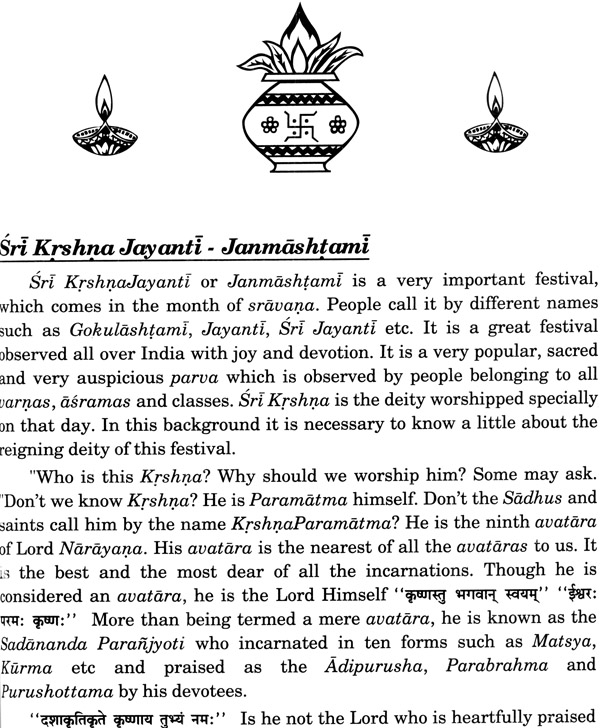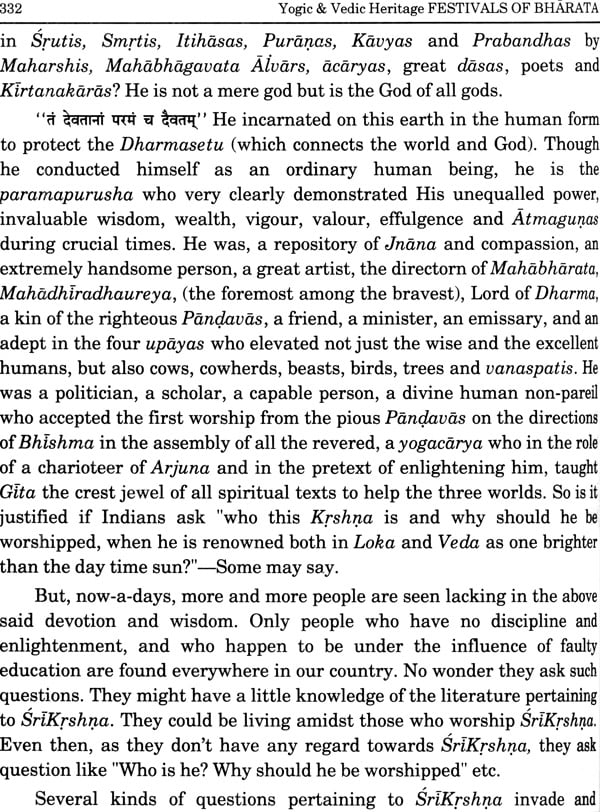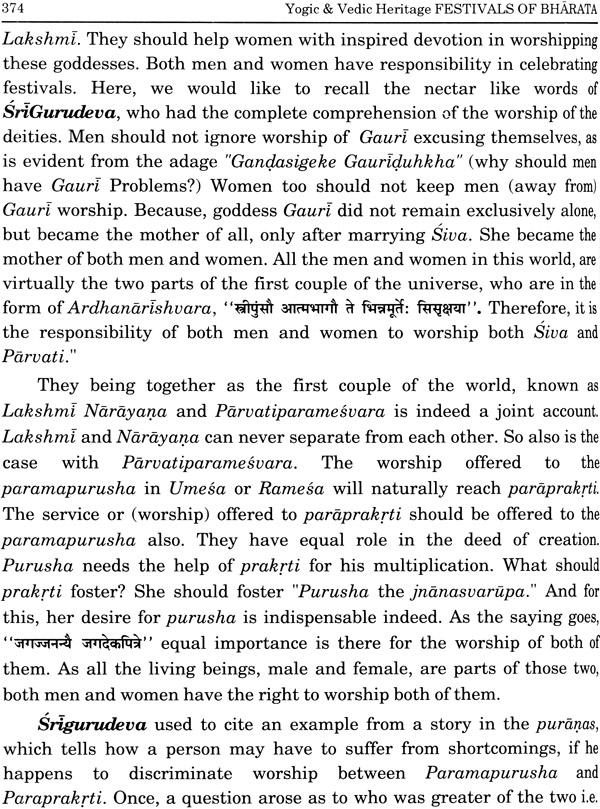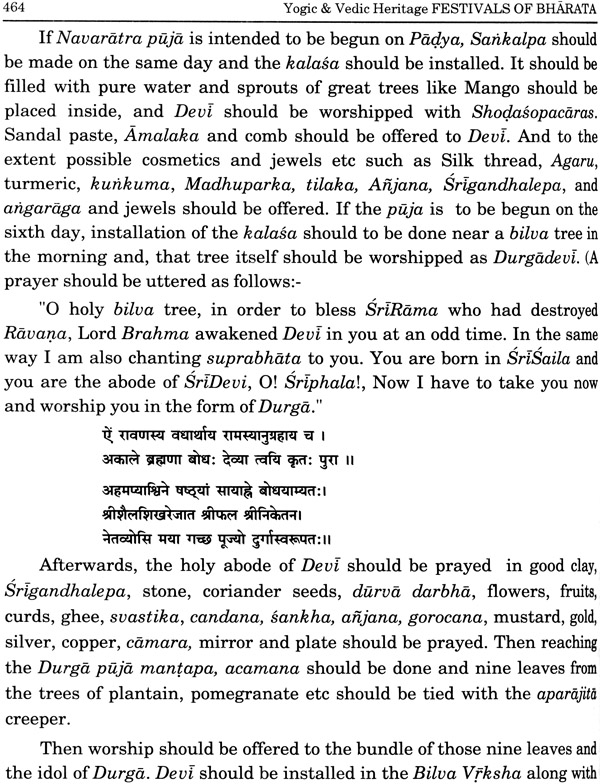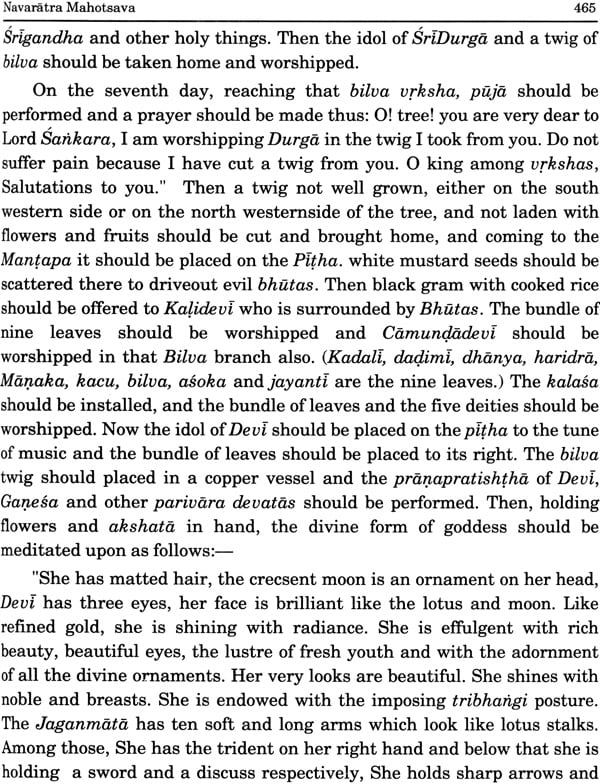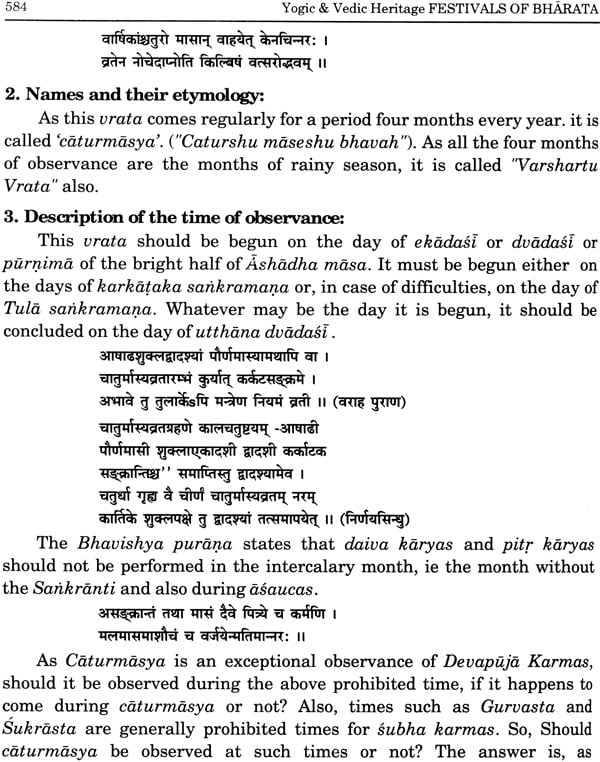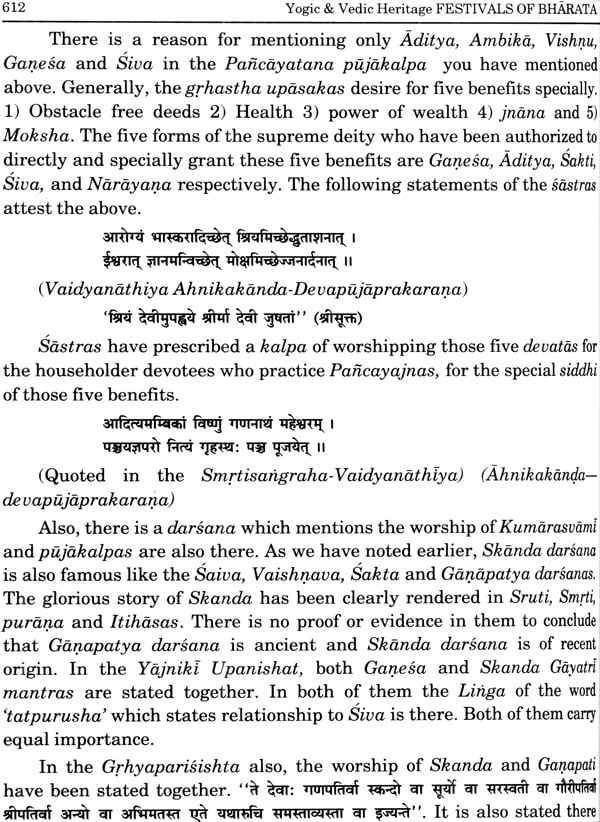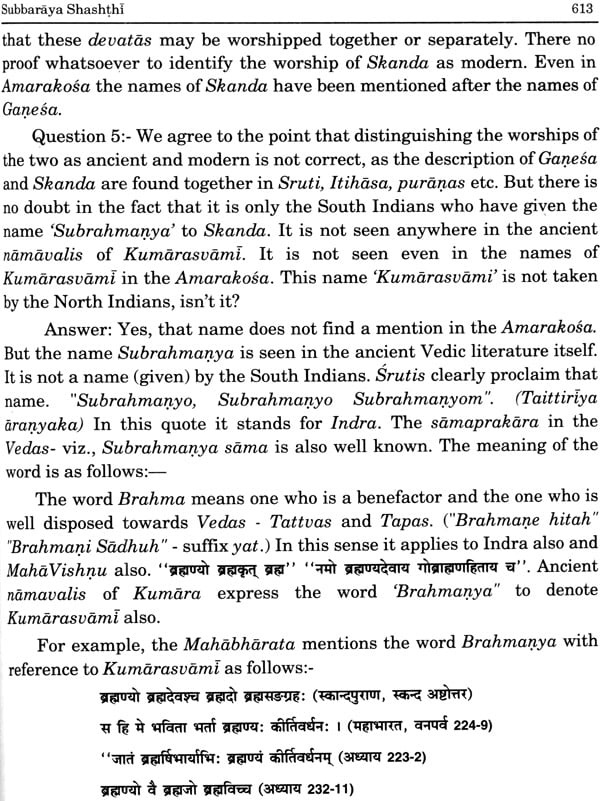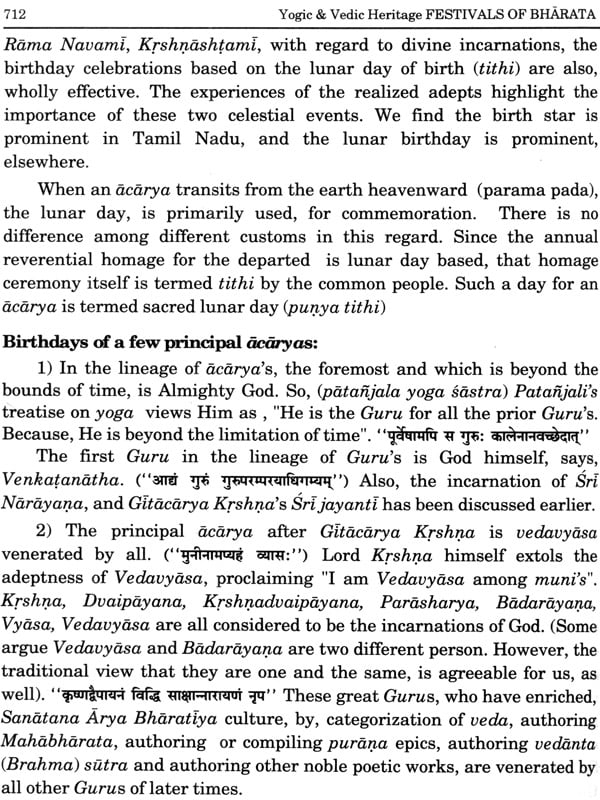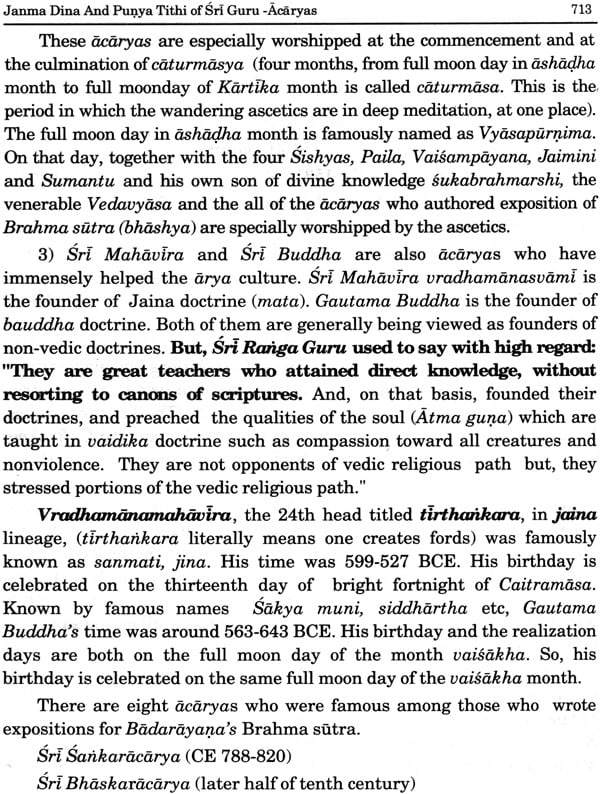
Yogic and Vedic Heritage: Festivals of Bharata
Book Specification
| Item Code: | NAK614 |
| Publisher: | BHARATHA SAMSKRUTHI PRAKASHANA, BANGALORE |
| Edition: | 2018 |
| Pages: | 744 (48 Color Illustrations) |
| Other Details | 9.5 inch x 7.5 inch |
| Weight | 1.40 kg |
Book Description
Publisher's Preface
We offer our endless pranams (obeisances) at the holy lotus feet of Sri Sri Rangapriya Sri Srih, the supreme Yogi, who was blessed by the grace of Sri SriRangamahaguru. H.H. the Swamiji was the president of Bharata Darshana, and is the author of this book.
By the grace of the kindly Lord, and the benevolent glance of the merciful Sadguru, and by the good wishes of the learned and good hearted persons, we are offering this book "Yogic And Vedic Heritage - FESTIVALS OF BHARATA" at the holy feet of God, and we are placing it as a sacred prasada in the hands of our dear readers.
Today, even though we celebrate many festivals that were graced to us by the enlightened persons (Jnanis), we are not observing them with the due knowledge of the spiritual science behind them. While some people are observing them with apathetic belief, some are observing them with half hearted trust, and also with indifference. Many people hit by hardships, poverty and want of time, observe the festivals with weariness, and curse the very arrival of these festivals and feasts. We are not being properly enlightened in this regard. At the same time, propagandists of Anarya Samskriti (unrefined culture), who are proliferating like the progeny of the demon 'Rakta beejasura', and armed with their practices, theories and activities, have been invading our culture and virtuous conducts. We have lost our discernment and also our pride, and so we are being subjected to scorn as a result of blind imitations. Let us explain this by an example:
The celebration of a birthday as per virtuous Bharatiya traditions include taking an oil bath and wearing of new clothes, lighting a lamp in front of God, offering obeisance to Teachers (Gurus) and elders, and seeking their blessings for health, prosperity, success, peace, contentment, good nourishment, and abundant growth, consuming prasada which consists of six different dishes, keeping away from either scolding others or getting abused by them, dwelling in auspicious thoughts, and drawing out a plan with family and friends happily for brightness and prosperity. But, due to the influence of the alien culture, a new custom (of celebrating birthdays) has made an entry in our country, even into the households of orthodox and tradition respecting people.
In this, cakes numbering the age of the person whose birthday is being celebrated are cut, and an equal number of lighted candles are put out. Nobody questions this. If at all anyone were to question this, the answer would be-"The cake, and the drinks taken along are the flesh and blood of Jesus. The number of lamps put out stand for the number of years completed by the person so far, and it is a symbol of the vow -'Let us lead a good life at least in future'. - This is the new custom.
It is a disgrace that followers of Sanatana Arya Bharateeya Samskruthi are into accepting this custom and its observance, like copy cats. Because, on a birthday, one is supposed to consume prasada (consecrated food) offered to God, and not the flesh and blood of a great soul who was crucified by inconsiderate people who lacked judgment. The auspicious thoughts on that day should be about long life, and making a sacred vow '-Tanme manasshivasankalpamastu', and not the remembrance of the past days of bad Vasanas (impressions of good or bad actions)
The act of putting out the light (in the candle) is a custom which is indeed most inauspicious and an unwished one. In the homes of the virtuous and tradition respecting people, no one would utter the words- "Blowout the lamps'. Instead one would only say-"increase the light of the lamp". (In Hindi they say 'Deepak badhavo' and not Deepak bazaavo') If the lamp is extinguished, light vanishes and darkness sets in. We generally pray God to lead us towards light from darkness - 'Tamaso ma jyotirgamaya' and not 'Jyotishah Tamo gamaya' (lead me towards darkness from light).
In the above custom of the aliens, only the part of drawing out a good plan (for the year) is O.K But the rest is all inauspicious. Why should Sanatana Arya Bharateeyas give up the custom of worshipping the auspicious deities and embrace the opposite of it?
This scared book is an attempt to set right to the extent possible, these erors related to the festivals and feasts, which have crept in because of lack of wisdom, laziness and lack of pride. The essays (articles) here scientifically explain the division of festivals, their common true form, necessity, importance, analysis, the proper and improper forms, the time of celebration, the materials needed, the method of observance, the benefits, and other such important matters. The Bharateeya festivals are not modes of forms of any blind tradition. They have a sound scientific background. The articles here indeed convince the virtuous who are free from prejudice, that the festivals have the potential to bestow the four-fold values of life i.e. Dharma (virtuous conduct), Artha (prosperity), Kama (Desires or enjoyment not opposed to Dharma) and Moksha (Liberation-Emancipation).
In the description of these festivals, a discerning explanation of the deities that are worshipped on the respective days (of festivals) is given. Some may feel that the explanations are very elaborate. But, many people at many places are falling preys to wicked propaganda about our deities, through the internet, print media and lectures, and thus we see a decline in devotion and faith towards our deities. Also, we have been noticing every day that enthusiasm is waning in matters of observance of festivals, in which those deities are worshipped. So, feeling the need for a scientific enquiry and discernment, we have utilized a good part of this book, with an aim to set right such wrong notions.
In this book we have reverentially used some words such as Sri Gurudeva (Holy Teacher), Maha Guru (Great Teacher). etc. The divine person thus referred to was one who bore the auspicious name 'Srirangamahaguru'. He was noble person, a supreme Yogi, and a great soul satiated with divine knowledge and divine science. He hailed from a sacred place called 'Hedathale' near the pilgrim center 'Nanjanagudu', near Mysore. He was a supreme preceptor who spiritually educated hundreds of blessed souls about Bharateeya Samskruti in a scientific way.
Revered Sri Sampath Krishna Desikachar (younger brother of His Holiness the Swamiji in his previous stage of life) is a fatherly figure and an elderly person. He has special admiration and affection for Bharatha Darshana Publications. He has kindly graced all our endeavors and has been guiding us.
Prof. Sri.K.S.Sridharan, a scholar in Sanskrit and Kannada is an amiable and an accomplished person. He was a student of His Holiness in the degree and postgraduate classes, and had the fortune of receiving the blessings and guidance of the venerable Swamiji in various aspects for over four decades. At our behest he undertook the difficult task of translating this book into English from the original in Kannada penned by His Holiness and has excellently brought forth the essence of Swamiji's words in this translation. Working hard for several months, he has completed this sacred task as a form of service to God. We are grateful to him for his invaluable and praiseworthy service done with great devotion and commitment.
Dr. Hungi Papanna Eswara a neurologist by profession has worked in many Hospitals in the US. He was specially blessed by the grace of His Holiness. To serve His Holiness personally and to obtain guidance in spiritual life under his supervision, he quit his profession in the U.S. and returned to Bangalore . He served His Holiness for twelve years with full devotion. To bring this English translation to the present form from the summarised form, he has worked hard to incorporate all the points, and has provided invaluable inputs. We are grateful to him for his commendable work.
Sri Viswanatha sharma, a long time resident of USA, worked as a consultant electronics engineer for several prominent companies there. He has great respect for Bharatheeya Culture. He is an Initiate in 'Kriya Yoga', and has practiced it for several years. He has studied the works of Sriranga Mahaguru and the revered Swamiji. He has translated the introductory and concluding chapters of this book into English. We are grateful to him for the same.
Prof. Sri. T.N. Prabhakar is a Sanskrit scholar, and retired as Additional Director in the Directorate of collegiate education, Karnataka. At present he is the editor for Bharatha Darshana publications. He has edited the Sanskrit slokas in this book. We are grateful to him.
Professor, G.S. Mudambadithaya is a retired Deputy Director of Public instruction in the department of Education, Karnataka. He has provided a summarised English translation of the original work. We are grateful to him for the same.
Srimathi Roopa Madhwapathy a post graduate in English, teaches English literature and also has been writing lessons at Cogswell Polytechnical College in California, USA. She has assisted in editing some chapters in the book. We are grateful to her for the same.
Our endless salutations to Ashtanga Yoga Vijnanana Mandiram and many individuals, who have cooperated directly and indirectly in the publication of this book.
Introduction
Yogic & Vedic Heritage FESTIVALS OF BHARATA
Festivals and Holy Days are very familiar, very important interwoven part of our religious and social life. Leaving aside the holy days, undoubtedly, festivals are objects of natural love to the entire human race. Poet Laureate Kalidasa, has observed this truth and says 'Human beings are fond of festivities' ("utsava priya khalu manuShyaaH" shaakuntala Act 6). They are especially happy occasions of life. The most common method in which people all over the world celebrate festivals is by getting together with family and friends, enjoying the savory gourmet foods, drinking to the best of their ability (at times, even spending beyond their means), singing, dancing and chit chatting to their hearts content, forgetting their troubles, if any. Whenever an opportune occasion arises even animals, birds and vegetation observe the 'eat, drink, make merry and rest and this verily is the feast' principle, which brings limited happiness. In addition, since they do not have mental volitions and doubts, worries, and anxieties they immerse more deeply on those merry occasions, enjoy the sensual pleasures, relatively more than us. However, human beings brag of their superiority in statements like "Man is the roof and crown of all things" (Tennyson), and 'there is nothing that compares to human body' ("naratan sama nahEEm kavaniwu dEhee" kaakabhushanDigaruDa samvaada, tulasi raamayaN). If these statements were not to be vain proclamations, but true, the standards of our festival celebrations should rise above the level of animalistic merry making. Each and every one of festivals that we celebrate ought to be rooted in sound judgment, and the planning, decorations, the serenity and the bliss, and the wealth of experience we derive from celebrations should meet even higher standards. These higher standards hinge on the cultural refinement of the practicing communities and they apply to 'hoLi' and deepaavaLi of Hindus, Bakreed and Ramzaan of Muslims, Easter or Christmas of Christians.
We have reviewed the generic meaning of the festivals. In addition to the festivals, we celebrate holy days known as "haridina''. Although this word has distinct conventional and philosophical meaning (these meanings will be explained subsequently), we may view these holy days as special occasions set apart for worship. Such holy days are found in every religious tradition that believes in God and in divine incarnations.
Although festivals and holy days, are celebrated by all people, sects, traditions, cultures and nations in a generic form, an in depth study reveals that the festivals and holy days shaped by the sanaatana aarya bhaarateeya culture have many distinctive features. The term "sanaatana" used here, does not convey the limited meaning 'that which belongs to ancient times or primeval'. We have to grasp its meaning as 'eternal' ('sadaatanasanaatanaaH') as illustrated in the lexicon. In a similar vein, the term 'aarya', is not used to convey the idea of a sect of people with a distinguishing skin colour and language as has been interpreted by some of the modern historians. It is used in its true sense 'one who speaks of the supreme being', and 'learned (scholarly) preceptors' as stated in the following quotations: (suShTu eerayanti prakRuSTaarthamiti aaryaaH), (''yamaaryaaH kriyaamaNam tu shaMsantuaagamauEdinaH I smRuti chandrikaa, kaa 1''). ('yadaaryamasyaamabhilaaShi mE manaH' shaakuntala anka 1), and (nacaavadadhbharturavarNamaaryaa' raghuvaMsha sarga 14). The term 'bharateeya' is not used to refer to people belonging to a sovereign territory which is determined by politics and may change from time to time. We can understand that the intention of using this term is to convey "people engaged in pursuit of spiritual enlightenment" (bhaaroopassatyakaamassatya sankalpaH), in the spirit of the upanishads. (Since mother nature has granted this great land for people to lead such a cultured life, we call it the land of bhaarata people). We opine that the festivals and holy days endowed by people engaged in eternal splendor of truth, in this fashion, have special features. Subsequently, we will expound on this' opinion, with praiseworthy reasoning (yuktipuraHsara). We can summarize our opinion here, in the following way: sanaathana dharma festivals and holy days are embodied in the knowledge [of the Supreme Being] and science [of creation]. Great seers, learnt the real form of these festivals by knowledge obtained by deep contemplation while they were in a meditative state, and preached them to us. With divine grace, they understood the intrinsic major and minor limbs of the time embodiment of the divine. They adapted that divine form to body and place. And, based on their findings, they preached very kind heartedly, the path of progression to attain the four fold aims of human existence (prushaarthas) [ethical precepts (dharma), righteous means (artha), desires (kaama) and emancipation (moksha)]. These festivals are celebrated with many types of sweets and puddings. But, these sweets are not limited to just pleasure of the palate and satiation. Sree Ranganwhaaguru used to remind us, "Sweets and juices consumed that day should not end up in culinary satisfaction only. They should be a feast for pleasing the God KrishNa (daamOdara) ". Likewise, the various pleasurable activities (vihaara) on that day, should not end up in limited play of the five senses, they should result in relaxation, as a result of the amorous play of the soul.
What is said above, is the proclamation of the spiritual endeavor. But, if we ask ourselves: Are these festivals and holidays yielding the fruits envisaged by the sages, even in the land that received their priceless gift of culture and tradition? What is their understanding of the festivals? How are they performing them? We cannot honestly answer these questions in the affirmative. We can observe that the gift of the sages is in a reprehensive state and lamentable form . We can analyze this state briefly as follows.
1. Although we observe many festivals we are not deriving full satisfaction by practicing them, because we do not perform them with wisdom. We recant the words of Sree RangamahaagunI here. "A half asleep child will not experience the nectary taste _of the milk feeding. In the same way, unwisely practiced festivals are not oozing the savory essences. They may only help sustain the lingering life offestival culture". In spite of nourishing feast and merriment, attire and adornments, even the sparse worship we perform and the spiritual stories that we listen to, are yielding only a little bit of satisfaction, since they are being followed without the proper attitude, methods and procedures. The four fold aims of human existence (chaturbhadras, purushaarthas) wished by the pioneers of the culture are not being realized.
2. Not only these celebrations are not yielding the promised excellent rewards, but they are also resulting in ominous consequences, since the knowledge of what the practice is, what the object of the practice is, and how it can be used, is lost. To cite an example, the great seers have taught us that all-night vigil on Shivaraatri festival is most auspicious. They have prescribed prayers and worship of Shiva, in each phase of the night, so that we can attain spiritual wealth, during these invaluably auspicious time periods with special properties. But, many people think that they have to stay awake somehow to accrue virtue, and so, they keep awake by gambling, watching sense teasing erotic movies and other despicable activities. These excursions will not produce peace of mind, rather they disturb the environment and disturb the minds of these observers. If these negative results cause troubles in their lives, some of these misguided people hold Shiva and Shivaraatri festival responsible for their misfortune!
3. Festivals are, no doubt, occasions of great rejoicing and happiness.
However, there is no rule that happiness is limited just to the delight of the sense faculties. Even when no food is consumed, such as during mahaashivaraathri and prathamaikadashi, these celebrations are known as fasting festivals in our tradition. If one asks, how can the days when no food is consumed be festivals, the answer is that on that day by performing worship of the Almighty, the soul has to experience inner bliss, which is the spiritual food of its true nature. So, in this sense they are also festivals. They are occasions of great rejoicing. (It is an accepted rule that those whose constitution will get upset without having some food may consume light food.) On festivals where special foods are prescribed, those who do not have the means to observe festivals according to the customs, can substitute them with leaves, flowers, fruits and water (patram, pisShpam, phalam toyam yo me bhaktya prayacchatigeeta) and worship with love to gain the fruits of the festival observance. If people do not understand this essence and think that preparing and consuming different prescribed foods are the only main part of the festivals, they will borrow money and finally end up in untold sufferings due to burden of loans. Some people even complain, "These rotten festivals have ruined me." and earn the blemish of blaming sacred festivals, in addition to the sufferings mentioned earlier.
4. For many people the festivals of our culture, has become a puzzle for various reasons and it has resulted in ridicule and incoherent opinions. The main issues of the puzzle are the number and variety of the festivals.
Scholars lecture, "We do not reject festivals of merriment. People of all countries have these festivals. But, in our land, every dawn ushers in a festival. There is not a day without a festival. They result in waste of time, money and productivity! The desire to eat and adorn new clothes results in a lot of waste of money. Time is spent in idling. Demand for holidays increase. These festivals have become the reason for providing beds for the lazy people to sleep. Therefore there is an urgent need to restrict the number of festivals in the interest of the social and economic welfare of the society and the nation."
There are thousands of gods. There are hundreds of festivals for them. People fight claiming one festival is more important than the other. For every festival, the scripture declares that it is the most superior of all the festivals and the rest of them do not even compare to one sixteenth of this festival, in merit. (vratanaamuttamaMvrataml anyaani tu vrataanyasya lalaam naarhanti ShoDasheeM"). There is no answer to the question: Which festival's proclamation of the benefits are genuine?
"The fact that there is no unanimity about the specific dates for some of these festivals has resulted in division among people. The date for the New Year's Day (ugaadi) according to solar (saura maana) lunar (chandra maana) and Jupiter (Brahaspatya maana) calendars are different. Lack of a common date agreeable to all for festival days like prathama ekaadashi, krishna a ShTami, Sree jayanthi and many other festivals cause arguments. In contrast, let us look at the systematic nature with which Christmas is celebrated. It is celebrated on the same day, every year in all the countries of the world". Orderliness of date of Christmas and the disorderliness of our festival dates are of equal weight. Some of these criticisms and comparisons are the direct result of lack of understanding of the essence of the festivals of bhaarateeyas. Some of these variations are the result of the mutilated form of our festivals. In any case, these facts have created confusion in the community.
5) Due to various notions described above, the mentality of mocking and deriding our festivals and holydays of our culture are on the rise, even among our own people. Proponents of opposing religious faiths are feeding fuel of their amity to this raging fire of disgust.
Contents
| Introduction-Yogic & Vedic Heritage FESTIVALS OF BHARATA | 1 |
| Ugadi Festival | 39 |
| Sri Ramanavami | 65 |
| Hanumajjayanti | 127 |
| Akshaya Tritiya | 149 |
| Narasimha Jayanti | 191 |
| Prathamaikadasi | 237 |
| Nagapuja- Nagarapancami | 259 |
| Varamahalakshmivrata | 283 |
| Upakarma | 299 |
| Sri Krishna Jayanti - Janmashtami | 331 |
| Gauri Festival | 373 |
| Ganesa Caturthi | 393 |
| AnantaPadmanabha Vrata | 443 |
| Navaratra Mahotsava | 453 |
| Dipavali | 495 |
| Utthanadvadasi | 529 |
| Sankranti | 547 |
| Caturmasya | 583 |
| Krittika Dipotsava | 591 |
| Subbarayana Shashthi | 605 |
| RathaSaptami | 625 |
| Mahasivaratri | 643 |
| Holikotsava, Holi Habba, Vasantotsava | 689 |
| Janma Dina And Punya Tithi of Sri Guru -Acaryas | 705 |
| Glossary | 715 |

